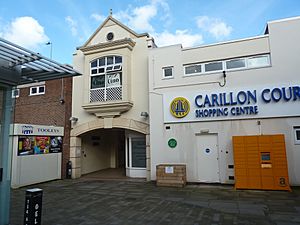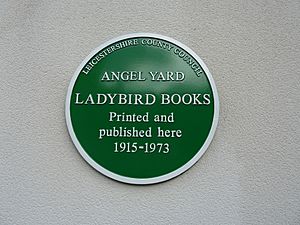Ladybird Books facts for kids
 |
|
| Parent company | Penguin Random House |
|---|---|
| Founded | 1867 Loughborough, Leicestershire, England |
| Founder | Henry Wills |
| Country of origin | United Kingdom |
| Headquarters location | London |
| Publication types | Books |
| Fiction genres | Children |
Ladybird Books is a famous British publishing company that creates books for children. It is known for its small, colourful hardback books that have been loved by families for generations.
Today, Ladybird is an imprint, which means it's a special brand name within the larger Penguin Group. It is part of Penguin Random House, one of the biggest book publishers in the world.
Contents
The Story of Ladybird Books
The history of Ladybird Books starts way back in 1867. A man named Henry Wills opened a bookshop in the town of Loughborough, England. Soon, he started printing his own books, like guidebooks for the local area. In 1904, William Hepworth joined him, and their company was called Wills & Hepworth.
It wasn't until 1914 that Wills & Hepworth published their first books just for children. They decided to call this new line of books "Ladybird." They also created a logo of a ladybird beetle. At first, the ladybird had its wings open. But in the 1950s, it was changed to the famous closed-wing ladybird that many people recognize.
The company officially changed its name to Ladybird Books in 1971 because the brand had become so popular.
Helping Children Learn to Read
During the 1960s and 1970s, Ladybird became very important in British primary schools. In 1964, they launched the Key Words Reading Scheme. This series of 36 small books was designed to help children learn how to read.
The books used a small number of common words over and over again. This made it easier for kids to recognize them. The stories often featured two children named Peter and Jane and showed a simple view of family life. The colourful and friendly illustrations by artists like Harry Wingfield and Martin Aitchison made the books very popular.
Books About the World
Ladybird didn't just publish storybooks. In the 1960s, they created the Learnabout series. These were non-fiction books that explained all sorts of topics, from science and nature to history. They were so clear and easy to understand that even some adults used them to learn new things.
Changes Over the Years
For a long time, Ladybird was its own company. In 1972, it became part of a larger company called the Pearson Group. Later, in 1998, Ladybird joined Penguin Books. This brought it together with other famous children's publishers like Puffin Books and Dorling Kindersley.
In 2014, Ladybird joined a campaign called Let Books Be Books. The company promised to stop labelling its books as "for girls" or "for boys." They wanted to make sure any child could feel welcome to read any of their books.
The Classic Ladybird Book Design
The classic Ladybird book had a very specific size and shape. It was a small, pocket-sized hardback book, about 11.5 cm by 18 cm.
Each book was exactly 56 pages long. This was done for a clever reason: a whole book could be printed on a single large sheet of paper without any waste. This smart printing method kept the books cheap to make. For nearly 30 years, a Ladybird book cost only two shillings and sixpence (about 12.5p in modern money).
The very first book in this style was Bunnikin's Picnic Party, published in 1940. It was a story in rhyme with beautiful colour pictures. It was a huge hit and led to many more books featuring charming animal characters.
Ladybird Books for a New Audience
Books for Grown-Ups
In 2015, Ladybird did something surprising. They released a series of books for adults, but in the classic Ladybird style. These books used the same simple text and artwork but made jokes about modern adult life.
Written by comedy writers Jason Hazeley and Joel Morris, the series included funny titles like The Hipster and Dating. The books were a massive success because they reminded adults of the books they read as children.
The Ladybird Expert Series
Following the success of the adult books, Ladybird launched the Ladybird Expert series in 2017. These books are not jokes. Instead, they use the classic, easy-to-read format to explain serious subjects.
The series covers topics in science and history. The first book was about Climate Change, co-written by the Prince of Wales. Other books in the series explain subjects like Quantum Mechanics and Evolution in a clear and simple way.
See also
 In Spanish: Ladybird Books para niños
In Spanish: Ladybird Books para niños



